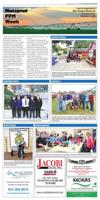Indiana Dept. of Transportation contractor Lutgring Bros. Inc. is scheduled to close S.R. 62 between Kensington and Tandy roads on or after Wednesday, April 17, to complete a culvert replacement near Lanesville.
Hoosier Park in Anderson has now completed the first three weekends of 2024 harness racing with some local horses competing.
Mary Jane Ehalt, 92, of Georgetown, Ind., met her Lord and Savior on Sunday, April 7, 2024.
Lois Jacqueline (Jackie) Carpenter, 85, of Corydon, died Saturday, April 6, 2024, at Indian Creek Healthcare Center in Corydon. Visitation will be Saturday, April 13, from 10 a.m. to 2 p.m. at Beanblossom-Cesar Funeral Home in Corydon. The funeral will be that day at 2 p.m. at the funeral ho…
Nancy J. Geary, 87, of Corydon, died Monday, March 25, 2024, at Norton Hospital in Louisville, Ky.
Nancy Carol Foreman, 87, Georgetown, Ind., passed away Saturday, March 30, 2024, at Villas of Gurin Woods in Georgetown, Ind.
Death notices
DEATH NOTICES:
An employee in a high-stress technology job observed how his boss always “seemed totally at peace, totally chill no matter how messed up things got.” When one day opportunity presented to ask his boss in private how he maintained his cool, the boss explained, “Someday, someone you love will …



















Commented
Sorry, there are no recent results for popular commented articles.